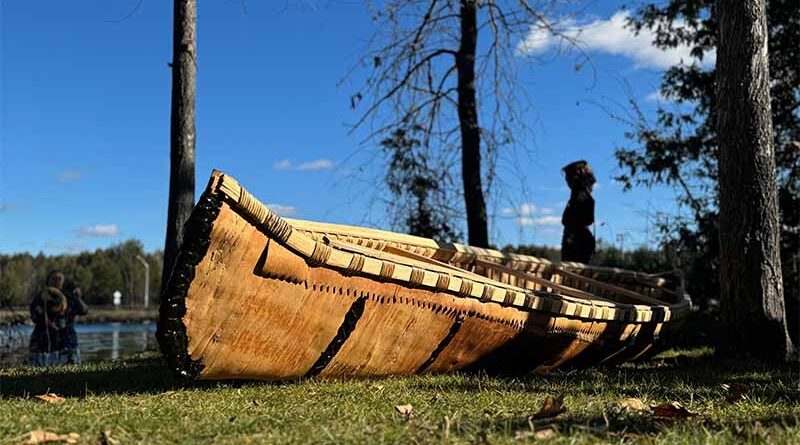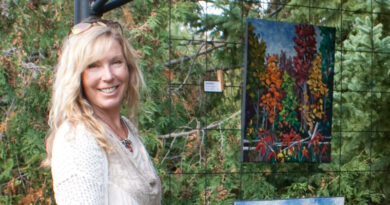Traditional Birchbark Canoe Handcrafted at Trent University Launched on the Otonabee River
Traditional naming ceremony for ‘Enheh’ and launch follows monthlong build in Trent’s Bata Library
Marking the culmination of a project that has increased visibility of and engagement in Indigenous
culture among the campus community, Enheh, a handmade traditional birchbark canoe, was
officially launched on the Otonabee River by Métis canoe builder Alex Labelle .
“The birchbark canoe is more than a vessel – it is a vital piece of technology that has sustained
Indigenous peoples for generations,” said Dr. Dawn Memee Lavell-Harvard, director of First Peoples
House of Learning at Trent. “It enables trade, travel, hunting, and the gathering of food and
medicine. By bringing together people from across the University and the community, this project
has demonstrated what reconciliation looks like in action: doing hands-on work, thinking about
knowledge holders in a different way, and showing that these knowledges are just as important now
as they ever were.”
Students, staff, faculty, and community members gathered to witness the launch and culmination of
Labelle’s monthlong building project. The launch event also featured a naming ceremony where the
canoe was given the name Enheh. This name is an affirmative response that complements the
expression of gratitude in Miigwech, and honours the connections made during the building and the
profound appreciation for the gifts and lessons provided by the people involved, nature, and the
Creator.
Labelle’s work constructing the canoe from scratch in the atrium of Trent’s Bata Library transformed
the space into a hub of cultural exchange and collaboration. Students, faculty, and visitors had the
opportunity to engage directly with the project by trimming roots, splitting cedar, and forming ribs,
gaining insight into the artistry and skill behind traditional canoe-building.
“Part of reconciliation is creating space for Indigenous knowledge in places, like libraries, which
have long marginalized it,” said Trent’s University librarian Emily Tufts. “Over the past month, Alex
has shared his knowledge in a way that is physical, embodied, and deeply meaningful. This project brought the work of reconciliation out of the theoretical and into the practical and material, giving students and staff a chance to connect with Indigenous traditional knowledge firsthand.”
Following the naming, Labelle launched Enheh from the west bank of the Otonabee River, and
paddled the canoe to the east bank of campus, where it was then carried to the Gathering Space in
Trent’s First Peoples House of Learning for a celebratory feast. Enheh remains permanently on
display.
“It’s great to know that FPHL and Trent students will put this canoe to use. Often people will put
them up as museum pieces, but we’re trying to bring canoes like this out of museums and back to
into life,” said Labelle. “My time at Trent has been great—great people and lots of interest in the
project. I hope this has shown people that you can go into the bush and find all the materials you
need to build a canoe.”
About Alex Labelle
Alex Labelle is a skilled craftsman who learned the art of birchbark canoe building from his
grandfather, an author, artist and longtime canoe builder, Marcel Labelle. With his grandfather now
retired, Alex has taken over the family tradition, preserving the knowledge and skills passed down
through generations. Committed to sharing and teaching these skills, Alex works to connect people
with Indigenous cultural practices.
About Trent University
One of Canada’s top universities, Trent University was founded on the ideal of interactive learning
that’s personal, purposeful and transformative. Consistently recognized nationally for leadership in
teaching, research and student satisfaction, Trent attracts excellent students from across the country
and around the world. Here, undergraduate and graduate students connect and collaborate with
faculty, staff and their peers through diverse communities that span residential colleges, classrooms,
disciplines, hands-on research, co-curricular and community-based activities. Across all disciplines,
Trent brings critical, integrative thinking to life every day. Today, Trent’s unique approach to personal
development through supportive, collaborative community engagement is in more demand than
ever. Students lead the way by co-creating experiences rooted in dialogue, diverse perspectives and
collaboration. In a learning environment that builds life-long passion for inclusion, leadership and
social change, Trent’s students, alumni, faculty and staff are engaged global citizens who are
catalysts in developing sustainable solutions to complex issues. Trent’s Peterborough campus
boasts award-winning architecture in a breathtaking natural setting on the banks of the Otonabee
River, just 90 minutes from downtown Toronto, while Trent University Durham Greater Toronto Area,
delivers a distinct mix of programming in the east GTA.




